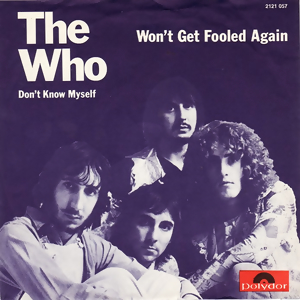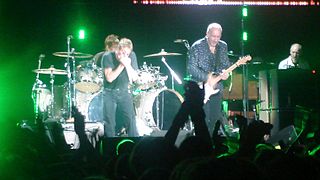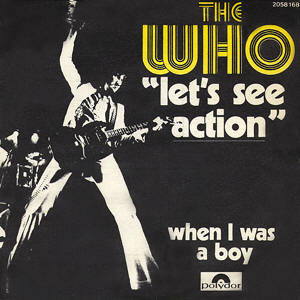Related Research Articles

Peter Dennis Blandford Townshend is an English musician. He is co-founder, leader, guitarist, second lead vocalist and principal songwriter of the Who, one of the most influential rock bands of the 1960s and 1970s. Due to his aggressive playing style and innovative songwriting techniques, Townshend's works with the Who and in other projects have earned him critical acclaim.

Who's Next is the fifth studio album by English rock band the Who. It developed from the aborted Lifehouse project, a multi-media rock opera conceived by the group's guitarist Pete Townshend as a follow-up to the band's 1969 album Tommy. The project was cancelled owing to its complexity and to conflicts with Kit Lambert, the band's manager, but the group salvaged some of the songs, without the connecting story elements, to release as their next album. Eight of the nine songs on Who's Next were from Lifehouse, the lone exception being the John Entwistle-penned "My Wife". Ultimately, the remaining Lifehouse tracks would all be released on other albums throughout the next decade.

Psychoderelict is a concept album written, produced and engineered by Pete Townshend. Some characters and issues presented in this work were continued in Townshend's later opus The Boy Who Heard Music, first presented on The Who's album Endless Wire and then adapted as a rock musical.
Lifehouse is an unfinished science fiction rock opera by The Who intended as a follow-up to Tommy. It was abandoned as a rock opera in favour of creating the traditional rock album Who's Next, though its songs would appear on various albums and singles by the Who, as well as Pete Townshend's solo albums. In 1978, aspects of the Lifehouse project were revisited by the Who on Who Are You. In 2000, Townshend revived the Lifehouse concept with his set Lifehouse Chronicles and the sampler Lifehouse Elements. On 1 May 2007, he released an online software called The Lifehouse Method in which any "sitter" could create a musical "portrait". The site is now defunct.

Lifehouse Chronicles is a box set released in 2000 by Pete Townshend with the focus of the box being the formerly "abandoned" Lifehouse rock opera. The set contains song demos by Pete Townshend; including solo versions of "Baba O'Riley", "Won't Get Fooled Again", and "Who Are You", and the Lifehouse Radio Program. The box set release was followed by two Sadler's Wells Lifehouse concerts and the release of a live CD and video/DVD titled, respectively, Pete Townshend Live: Sadler's Wells 2000 and Pete Townshend – Music from Lifehouse.

Endless Wire is the eleventh studio album by the English rock band the Who, released on 30 October 2006 in the UK through Polydor Records and the following day in the US by Universal Republic. It was their first new studio album of original material in 24 years following the release of It's Hard in 1982, as well as their first since the death of the bassist John Entwistle. It was originally due to be released in early 2005 under the working title WHO2.

"Baba O'Riley" is a song by the English rock band the Who, and the opening track to their fifth album Who's Next (1971). It was issued in Europe as a single on 23 October 1971, coupled with "My Wife".

"Won't Get Fooled Again" is a song by the English rock band the Who, written by Pete Townshend. It was released as a single in June 1971, reaching the top 10 in the UK, while the full eight-and-a-half-minute version appears as the final track on the band's 1971 album Who's Next, released that August.

Who Came First is the debut album by Pete Townshend, released in 1972 on Track Records in the UK and Track/Decca in the US.

I Am is a collaborative tribute concept album to Meher Baba featuring Pete Townshend, Michael Da Costa and others, first released in 1972. The album includes the original version of "Baba O'Riley" played by Townshend alone without lyrics, which, at 9:48, is almost twice as long as the augmented version which opens Who's Next.

The Boy Who Heard Music is a rock opus that began life as an Internet novella written by musician and songwriter Pete Townshend. Townshend wrote in the foreword to the novella that he typically sketches out his opera in this way to lay out the plots and storylines, but in this case he published the material on an Internet blog site in 2005 and 2006, opening an interactive discussion with readers. The work was later released as a maxi-single and album by The Who and adapted as a rock opera.

Happy Birthday is a collaboration album by Pete Townshend, the guitarist for The Who and friends, including Ronnie Lane. It was pressed and released in 1970 by Universal Spiritual League.
Bob Lord is a producer/composer/bassist and CEO of PARMA Recordings, parent company of label imprints Navona Records, Ravello, Big Round, MMC, and Capstone Records. He is also notable for being the bassist/composer of the experimental rock trio Dreadnaught, music director for the NHPR/Music Hall series Writers on a New England Stage, and in-studio producer of Grammy-winning clarinetist Richard Stoltzman.
Lawrence Ball is an English musician and composer who lives in North London. He produces multi-media compositions, performs in concert, and also works as a private tutor in mathematics, music theory and physics.
The Lifehouse Method was an Internet site where applicants could sit for an electronic musical portrait made up from data they enter into the website. This website was the result of a collaboration between the Who's principal songwriter and composer Pete Townshend, composer Lawrence Ball and software developer Dave Snowdon. The website was operated by Eel Pie Recording Production, Limited, a company set up in 1970 by Pete Townshend.
Biomusic is a form of experimental music which deals with sounds created or performed by non-humans. The definition is also sometimes extended to include sounds made by humans in a directly biological way. For instance, music that is created by the brain waves of the composer can also be called biomusic as can music created by the human body without the use of tools or instruments that are not part of the body.

"Don't Let Go the Coat" is a song written by Pete Townshend and first released on The Who's 1981 album Face Dances.
"Bargain" is a song written by Pete Townshend that was first released by the Who on their 1971 album Who's Next. It is a love song, although the intended subject of the song is God rather than a woman. The song has been included on several compilation and live albums. It was also included on several of Townshend's solo projects. Critics have praised the song's lyricism and power, as well as the performance of the band on the song. Townshend acknowledged during the Who's concert at the Prudential Center in Newark on 19 March 2016 that this is his favorite song on the album.

O' Parvardigar is a 2001 EP by Pete Townshend devoted to his song O' Parvardigar which in turn is based on Meher Baba's Parvardigar Prayer. The EP, which was released on Townshend's own label Eel Pie, contains three versions of the song—a 1972 studio version, a live version recorded in India, and a German-language version recorded for the opening of a European Baba Centre.

"Let's See Action" is a song written and composed by Pete Townshend and recorded by the Who. It was released as a single in the UK in 1971 and reached #16 in the charts.
References
- ↑ "Billboard.com" . Retrieved 16 November 2011.
- ↑ "Method Music" . Retrieved 16 November 2011.
- ↑ "Method Music on navonarecords.com" . Retrieved 23 December 2011.
- ↑ "Pete Townshend Opens The Lifehouse Door" . Retrieved 16 November 2011.
- ↑ "Lawrence Ball, Co-Composer Of "Fragments"" . Retrieved 16 November 2011.